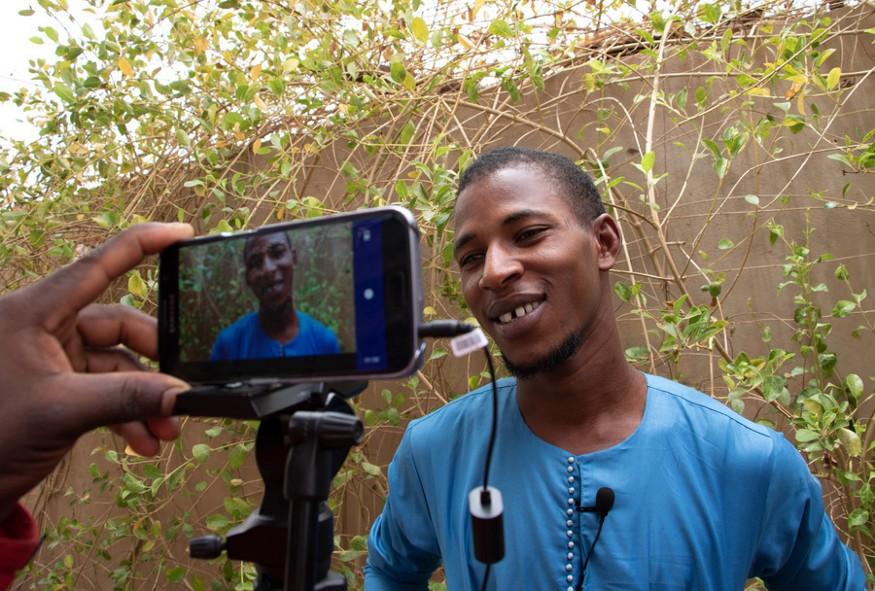‘Stay Home and Dance!’ Say Volunteers in West Africa
West Africa
Story
“I could not sleep for two weeks.”
The words of Ramatoulaye Diène, a returnee from Senegal, echo what millions around the world have experienced during the pandemic: anxiety, fear and disruption. The rapid spread of the virus and global response have constricted people’s lives, exacting a severe toll on mental health.
“The first time I went out in my area, I was so frightened that I avoided meeting people,” said Diène.
Diène is part of a network of returnee volunteers who launched a campaign in West Africa to address the less visible impacts of the current crisis on mental health and boost public morale. The ‘Stay Home and Dance Challenge’ began in April under the hashtag #StayHome, encouraging people to share videos of themselves on social media dancing at home and observing physical distancing measures.

Credit: Julia Burpee
The volunteers upload videos of themselves dancing at home and invite others to do the same through social media. The videos aim to lift people’s spirits, promote physical exercise and celebrate dance, while urging them to stay put to minimize transmission.
“I’ve realised how valuable leisure is to human existence, and how helpful it is in reducing stress. I had never paid attention to it but now I realise how important it is,” said Azuh Ify Chylian, a returnee and campaign volunteer from Nigeria.
The network of volunteers is made up of 250 returnees in seven countries, formed under the Migrants as Messengers (MaM) programme in West Africa, led by the International Organization for Migration (IOM). The programme encourages returnees to lead grassroots, positive communication activities relating to migration. Participating countries include: Côte d’Ivoire, The Gambia, Guinea, Liberia, Nigeria, Senegal and Sierra Leone.
Following the outbreak of COVID-19, MaM volunteers lent their skills to provide accurate information and lead creative initiatives to support their communities during the crisis. The ‘Stay Home and Dance Challenge’ is one of many initiatives led by the volunteers.
The campaign draws on the role of music as a form of expression to bring joy and relief, highlighting simple and productive activities to do at home during the lockdown. Videos have been shared from Côte d’Ivoire, The Gambia, Senegal and Nigeria, featuring people of all ages dancing freestyle alone or in family groups, or doing something at home that gives them joy.
“Dance is very important in Côte d’Ivoire, not only because it allows us to enjoy ourselves but also because it is a sport,” said José-Maria Adjoumani, a MaM Volunteer from Côte d’Ivoire.
“Ivorian artists stand out because of their incredible ability to continually create new forms of dance. So, to be up to date, you need to keep up.”
Taking part in the campaign has, according to MaM volunteers, helped them deal with the lockdown more effectively. Many returnees have experienced harrowing ordeals on their migration journeys. The pandemic is destabilising and can increase the vulnerability of many people. MaM volunteers are supporting their communities to address migration-related challenges and overcome the current crisis.
“A friend came to reassure me. We joined the community initiatives in our area and started raising awareness on the importance of physical distancing to prevent COVID-19 transmission. Taking part in these community activities has helped me during this period of anxiety and stress,” said Diène.
The returnees expanded the Stay Home and Dance Challenge to include other ways of staying physically and mentally healthy during the lockdown, including sharing videos on social media of themselves singing, reading, exercising and gardening.
“The Gambia is a small country where people are closely-knit,” said Amie Jobe, a MaM Volunteer from The Gambia.
“We work, play, sit and eat together. I normally enjoy having parties with my friends and family at the beach. I am however able to abide by the recommended precaution measures, such as staying
home and maintaining physical distancing at all times. The most important thing above all is my health and that of my friends and family.”
Watch the videos of people sharing positive ways to manage the lockdown.



